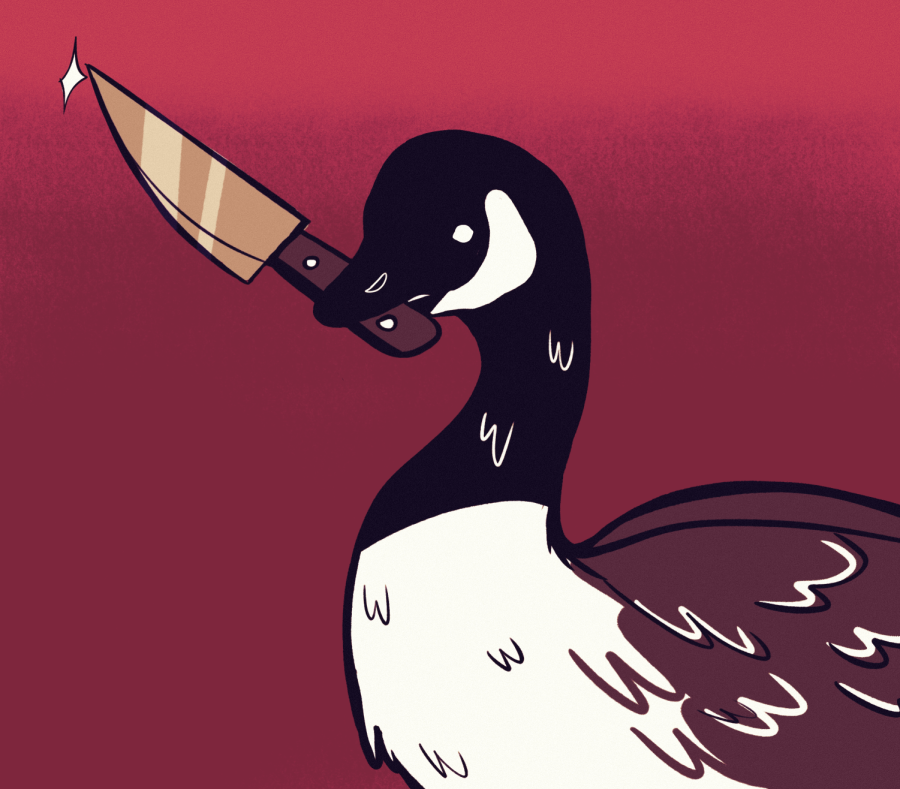Up to no good business: Geese frighten students with aggression, menace
Apr 29, 2022
They surround the campus and walk among the student body. They were here before mankind, and they will be here after human extinction. Emerging 12 million years ago in prehistoric Northern Eurasia, they have outlived the most treacherous and powerful empires curated by man. Humanity is nothing but a blip in their existence.
On the ground, they are a gaggle, and flying close together they are a plump. But to many, they are simply known as geese.
Geese have been a prominent staple of campus’ natural scenery. The University’s unofficial subreddit, r/UIUC, frequently has pictures of geese in wild places that appear as the thread’s daily top posts. Sometimes, the birds are pictured caring for their young and crossing the street. Other times, they are on the roofs of buildings.
While many students adore and admire the waterfowl’s inclusion in campus scenery, many have more negative opinions toward geese in the area, citing past and present instances of violent attacks and intimidation tactics.
Liz LeBeau, sophomore in LAS, explained an unpleasant encounter she had with a campus goose.
Get The Daily Illini in your inbox!
“I was walking with my boyfriend from I Hotel after (a) vaccine study, and while we were passing the State Farm Center, there was an angry goose that flew at us,” LeBeau said. “We ran away, and thankfully weren’t hurt, but it was a lot.”
Similar to LeBeau, Lauren Buccelli, sophomore in LAS, also had an encounter with agitated geese.
“On campus at a park, I was trying to walk on the sidewalk to get to a place to lay out a blanket and sit down,” Buccelli said. “There were geese on the path, though, and they would not let me through, and they started to get angry. I had to find a path around the geese because everyone knows they’re evil but eventually, they started to walk up to me a bit after I set my blanket up. I had to leave.”
Brian VanDyke, a graduate student studying chemistry, explained his troubled past involving geese, recalling a time at a golf course where he worked in high school.
“The geese would come in from the neighboring farm, poop on the tee boxes, eat from the pond, and then poop on the green,” VanDyke said. “Pretty much short grass-seeking poop missiles.”
Vandyke and his colleague Rodney were using weed whackers on the course when they had a violent encounter shortly after.
“Rodney had gotten too close to the geese and spooked them,” VanDyke said. “A bunch of them charged him, weed whacker and all, and chased him all the way back to the golf cart. When he was getting in, one of them bit him. Dude floored it, but those geese followed him until the next hole.”
However tumultuous the relationship between geese and man may be on campus, the University has extensive academic resources and studies done on the waterfowl by a diverse assembly of professors in the Department of Natural Resources & Environmental Sciences in the college of ACES.
Michael Ward, a professor in the college of ACES, spoke about his ecology experience studying geese as well as his understanding of the possible reason for their outbursts. Ward specializes in studying species of preservation concern and developing new approaches to protection like radio monitoring of the behavior and migration of birds.
“They are very interesting creatures,” Ward said. “They are this time of year breeding, they are already breeding and some have goslings here. So when you walk by a pair on the Quad and they act aggressive. They think you are a predator, so they’ll want to defend.”
Ward explained that defensive actions include posturing, lowering and raising their heads and hissing toward suspected threats.
“It’s when they perceive you as a threat that they will fly at you,” Ward said. “Then some people obviously are more afraid of birds than I am, so they might run. I’ve seen or heard instances where they chase people.”
Joy O’Keefe, a professor in the college of ACES, also spoke about the geese situation on campus, explaining that the territorial nature of the species is in full swing.
“We have a pair hanging out near Turner Hall here on the south side of campus,” O’Keefe said. “They change their positions daily. We see them setting up shop and they probably have a nest there somewhere, but I’m not aware of where it is.”
O’Keefe has spent years studying zoology, ecology and wildlife biology, with a focus on the coexistence of bats and humans in human-altered landscapes. Nonetheless, she has seen her share of geese activity, recalling an encounter during her time in college where she was attacked by Canadian geese.
“My house had a walking path around it when I was in college, and I was with some kids I was babysitting,” O’Keefe said. “I tried to check them out, and we got a little too close, so they came after us and tried to bite us.”
Despite the student testimonies, Ward shared his belief in the inoffensive existence of the geese on campus and the natural mannerisms at play.
“I mean there’s really, in my opinion, very little threat from geese,” Ward said. “They can’t really hurt you too much.”






